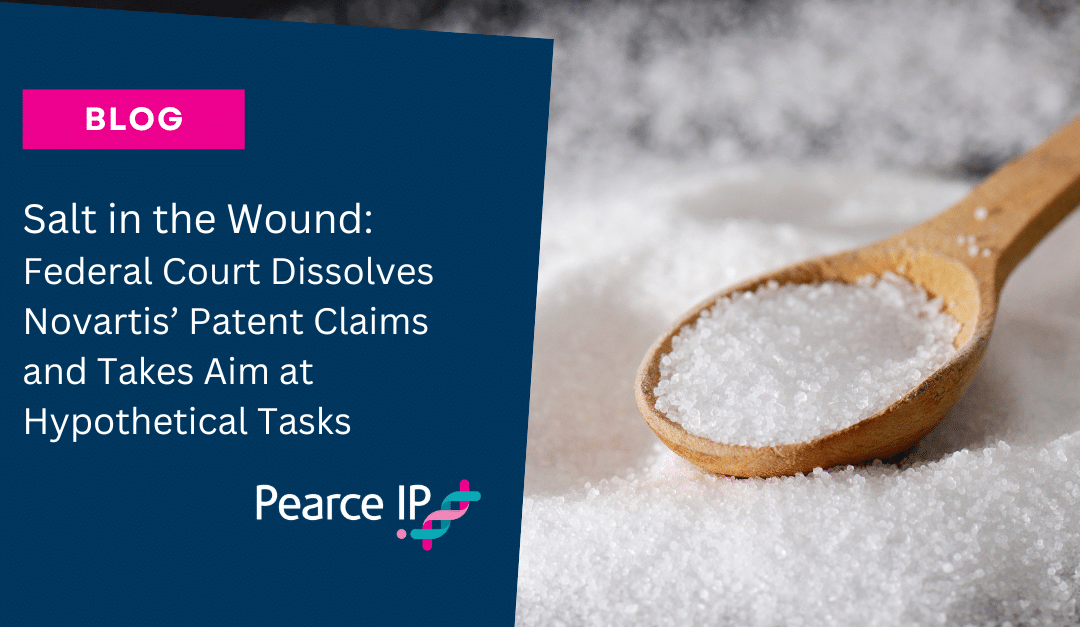In a recent Federal Court decision, Justice Rofe has dismissed an appeal by Dei Gratia Pty Ltd (Dei Gratia) against the Commissioner of Patents’ (the Commissioner) refusal to grant its patent application…


In a recent Federal Court decision, Justice Rofe has dismissed an appeal by Dei Gratia Pty Ltd (Dei Gratia) against the Commissioner of Patents’ (the Commissioner) refusal to grant its patent application…

Justice Burley has handed down a decision in a long-running dispute between Otsuka Pharmaceutical Co., Ltd (Otsuka) and Generic Health Pty Ltd (Generic Health), refusing to grant a stay of proceedings pending the delivery of judgment by the High Court in Commonwealth of Australia v Sanofi & Ors (Sanofi).

On 19 September 2024, the Federal Court of Australia delivered judgment ordering Medtronic Australasia Pty Ltd (Medtronic) to pay $22 million in penalties following proceedings bought by the Department of Health in August 2021…

On 13 November 2024, Justice Yates of the Federal Court of Australia delivered his decision in the dispute between Novartis AG and Novartis Pharmaceuticals Australia Pty Limited (together, Novartis) and Pharmacor Pty Limited (Pharmacor) regarding patent AU2003206738 entitled “Pharmaceutical compositions comprising valsartan and NEP inhibitors” (the Patent).

Justice Jackman has delivered the latest decision in the long-running dispute between Lundbeck and Sandoz regarding Lundbeck’s Australian Patent AU1989036295 for the “(+)-enantiomer of citalopram and process for the preparation thereof”.

As patent proceedings involve substantial legal expenses, parties typically employ various mechanisms to optimise cost recovery, often by issuing Calderbank letters as well as formal Notices of Offer under the Federal Court Rules, which place the receiving party at risk of indemnity costs orders should the other party receive a more favourable judgment than the terms proposed in the offer.

Delegate Wagg of the Australian Patent Office has ruled in favour of Dana-Farber Cancer Institute, Inc. and The General Hospital Corporation (the Applicants) in “straw person” opposition proceedings brought by QIP Nominees Pty Ltd (QIP), a company within the QANTM intellectual property group.

Sandoz has triumphed in its appeal regarding the validity of two of Bayer’s Australian Xarelto® (rivaroxaban) patents. On 23 October 2024, the Full Court unanimously overturned Justice Rofe’s decision of 2 November 2023, holding that the two Bayer patents lack an inventive step in light of the common general knowledge taken together with a prior art patent specification. The parties have been given until 4 November to propose orders giving effect to the Full Court’s decision.

In a recent decision of the Australian Patent Office, Delegate McCaffery has ruled on opposition proceedings between ResMed Pty Ltd (ResMed) and Fisher & Paykel Healthcare Limited (Fisher & Paykel). The proceedings concerned six patent applications relating to patient interfaces for delivering breathing gases, with specific focus on nasal seals for continuous positive airway pressure (CPAP) therapy.

On 18 June 2024, Justice Burley delivered a decision regarding documentary discovery in the long running dispute between Pfizer (Pfizer Ireland Pharmaceuticals and Pfizer Australia) and four of its competitors over AU2005280034 for the “Production of polypeptides” (the Pfizer Patent).

On 18 June 2024, Justice Burley delivered a decision regarding documentary discovery in the long running dispute between Pfizer (Pfizer Ireland Pharmaceuticals and Pfizer Australia) and four of its competitors over AU2005280034 for the “Production of polypeptides” (the Pfizer Patent).

On 18 June 2024, Justice Burley delivered a decision regarding documentary discovery in the long running dispute between Pfizer (Pfizer Ireland Pharmaceuticals and Pfizer Australia) and four of its competitors over AU2005280034 for the “Production of polypeptides” (the Pfizer Patent).

On 18 June 2024, Justice Burley delivered a decision regarding documentary discovery in the long running dispute between Pfizer (Pfizer Ireland Pharmaceuticals and Pfizer Australia) and four of its competitors over AU2005280034 for the “Production of polypeptides” (the Pfizer Patent).

The Federal Court has continued its run of decisions on contested costs orders. The cost of litigating patent disputes in the Federal Court is high. To maximise the costs recovered, parties are issuing Notices of Offer (pursuant to the Federal Court Rules) and Calderbank letters. These are designed to put the other party at risk of an indemnity costs order should they reject the offer and the first party ultimately receives a more favourable judgment. Indemnity costs orders enable a successful party to claw back up to 100% of their legal costs, whereas a party/party costs order typically only provides a successful party with around 60% of their actual legal costs. So, significant sums of money can be at stake as a result of an effective or ineffective Notice of Offer or Caldberank letter.

The battle to claim the earliest valid patent rights to CRISPR gene-editing technology has been fought around the world. In Australia, the most protracted dispute…

CQMS has successfully opposed ESCO Group’s (ESCO) patent application AU 2018201726 (‘726) on the grounds of lack of support and sufficiency. We previously reported on an opposition between the same parties for a related patent family member AU 2018201710 (‘710). As with that case, the Delegate in the present opposition exercised his authority under section 60(3) of the Patents Act 1990 and raised the additional opposition ground of inutility, which was not asserted by CQMS.